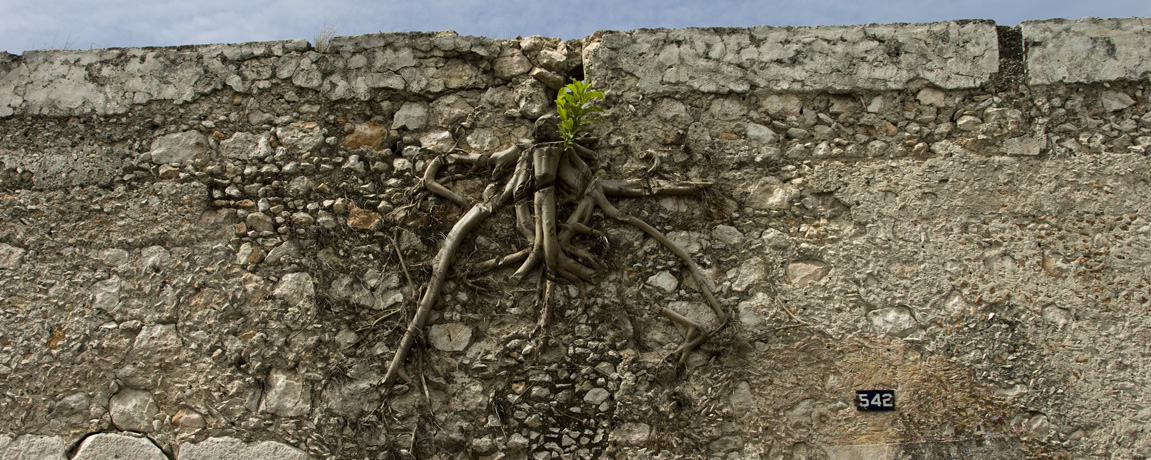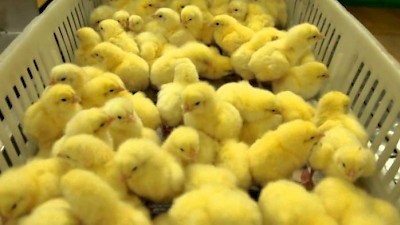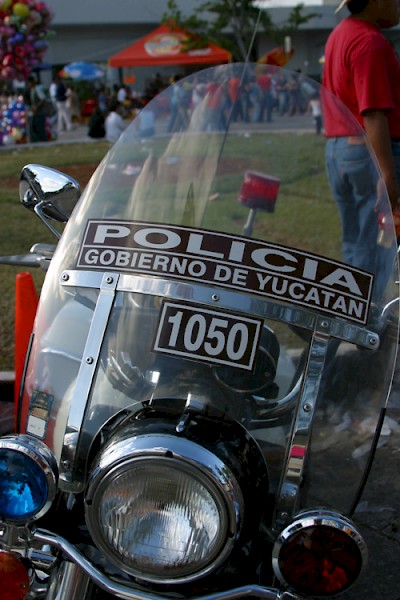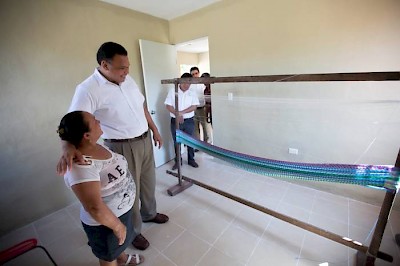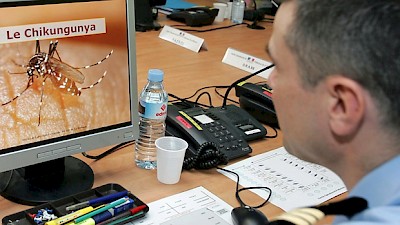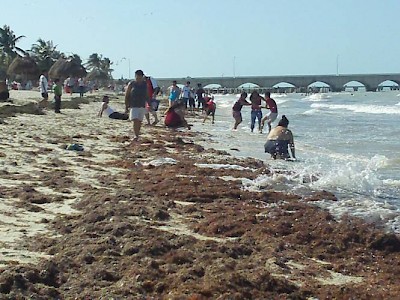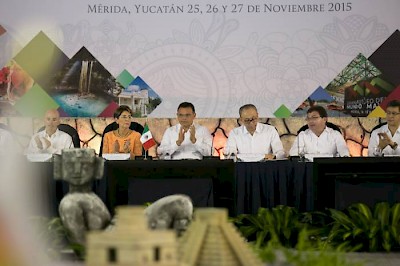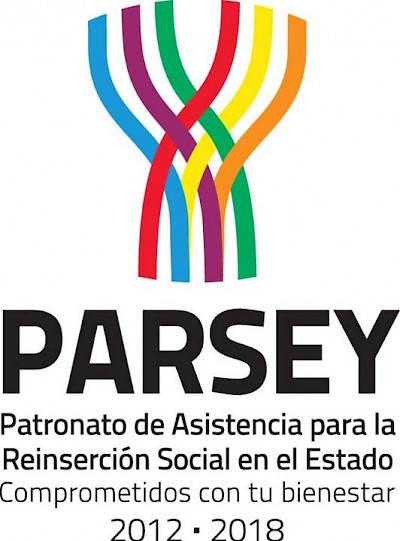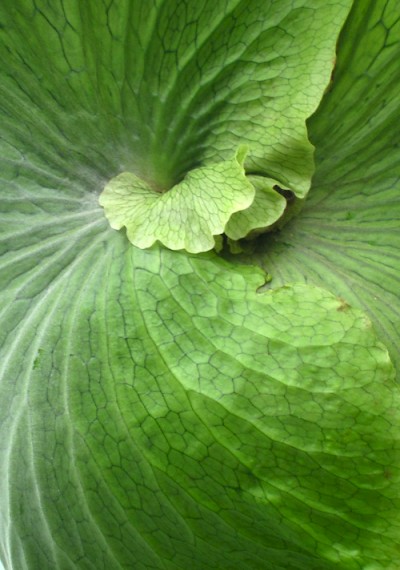Yucatan News: Chicks, Plants and Police
Baby Chicks
Bachoco is a company that supplies fertile eggs throughout Mexico. Over the next three years, they will be investing $3 billion pesos in the Municipality of Tekax in order to expand their Yucatan operations by some 500 hectares. Currently, Bachoco generates more than 400 direct jobs in the Municipality of Tekax and that number is expected to be significantly larger when this project is in full swing. Bachoco is also constructing a plant to produce breaded chicken breast nuggets to export to a restaurant chain in the United States. They have breeding farms in Tekax, Kinchil, Tekit and Sitpach, as well as indubation units, and operations to produce table eggs and broilers. In all, Bachoco produces about 9,000 tons of chicken and 700 tons of eggs monthly in Yucatan and those numbers will increase with the completion of this new facility. Exports are growing to the United States and to Central America, so this is a project whose time is now.
Free Housing for Policemen
Everyone, the world over, is aware that policemen are some of the lowest paid professional civil servants. These are people who dedicate their lives to protecting the public, with little hope for ever owning a new home or being free of a crippling monthly mortgage. That is changing in Yucatan. Two hundred policemen are getting a brand new home thanks to a new program that is the result of a collaboration between the state and federal government. Most of these homes are in outlying areas where a new home for a policemen was, until now, not even the stuff of dreams. Congratulations and Happy Holidays to the recipients of this program and many thanks to those who are presiding over this program.
Early Happy Birthday to Hennessey’s Irish Pub
Hennessy’s Irish Pub will celebrate its fifth birthday in Merida on Thursday, December 10. Over these past five years, Hennessy’s has developed a solid following. If you are looking for a Monday night movie, or a place to enjoy with polo friends, or a sports bar, or a place to sit outside and hang with your friends, Hennessy’s seems to have discovered and met every need for their clientele. That’s a lot to accomplish for only five years, and Sean Hennessy and Colm Cooney, natives of Dublin, Ireland, have earned his chops as the owner of one of the most successful establishments in Merida. We wanted to get this in early so that everyone can make plans to be at Hennessy’s Irish Pub on Thursday, December 10, 2015, at 7:00 PM. The address is Paseo Montejo. Calle 56-A #486A x 41 y 43. They’ll have games, prizes, T-shirts, 14 performers, and … free beer! Everybody is welcome! (and por supuesto you are planning to be there two nights earlier, also at 7 pm, for our Ten Years of Yucatan Living book signing, right??)
Chikungunya Now Linked to Deadly Encephalitis
Scientists noticed a possible link between chikungunya fever and encephalitis as early as 2005, but have only now been able to definitively show that there actually is a link between the two. At the present time, there is no vaccine to prevent chikungunya and no medicine for it. Those most at risk are persons over 65 and infants. Until 2014, every patient in the United States had contracted the virus while traveling. However, in 2014, Florida saw its first locally-acquired case. This is a very dangerous virus because its rate of encephalitis is much higher than the risk for all other forms of encephalitis, leaving all victims at serious risk for developing the secondary brain infection. In the Reunion Island population, 56 people developed chikungunya, 24 of those went on to develop chikungunya encephalitis. Almost 17% of the chikungunya encephalitis patients died and 45% of the children ended up with long term disabilities, such as behavioral changes or difficulty thinking or remembering. At the present time, responsibility lies with the individual and their communities to keep them safe from mosquito bites, and so far, no one has died of chikungunya in Yucatan, though many have experienced it! Stay away from mosquito-infested areas, wear long sleeves, and stay indoors at dusk and dawn. If you feel ill, see a doctor for supportive treatment immediately.
Yucatan Gets Ready for the Auto Industry
Yucatan has a place on the Board of the Mexican Association of the Automotive Industry. In that capacity, the administration has had opportunity to explore investment opportunities for the automotive industry in the state for both vehicle assembly and for the production of auto parts. This is not a problem. The Governor of Yucatan has already given the go-ahead for 17 public and private educational institutions to ensure that 27 educational programs are revamped with an eye to turning out the auto workers necessary to bring these jobs to Yucatan. At the present time, a little more than 4,000 students are ready to alter course and obtain the technical and university educations necessary to take advantage of this opportunity. When the Science Park was first built, it was a lonely group of buildings that were partially occupied. It was hard to believe that it wouldn’t be too many years before Merida’s Science Park would hold the largest number of applied and theoretical mathematicians in all of Mexico. Yes. Yucatan is ready for the automotive industry at every level, and very proud of the quality of students the state has to offer.
Yucatan Takes A Holiday
Many expats take their own vacations when schools are out for long holidays in Yucatan. This year, the last day of classes in 2015 will be Monday, December 21. Classes will resume on Thursday, January 7, 2016. The school year will end on July 19, 2016. This will ensure that students are in class for the required 200 days per calendar year. These dates are specific to public schools, but it is expected that private schools will follow the same dates. Although these are the published dates for the Christmas break in Yucatan, Quintana Roo has just announced that they have backed their school vacation calendar up by a couple of days and their end of the year by several days as well. If any changes are made in Yucatan, they will be well publicized and we will list them in our news for your convenience.
Seaweed Dunes: Look Bad, Smell Worse
High, rough tides have covered Yucatan’s beaches with seaweed. This includes the Malecon in Progreso, where cruise ship visitors get their first glimpse of Yucatan. After a day or two, the seaweed begins to rot and smells terrible, and has the potential to cause health problems for those who live in the area. As restaurant workers continued to try and clean as much as they could by hand, the public works department arrived with heavy equipment, dug a trench and buried the seaweed. By the time they finished rearranging the sand, there was little evidence it had been there at all. Unfortunately, it does not look as if high tides and seaweed are gone for good. This struggle to keep Yucatan’s beaches in presentable shape will be ongoing as long as bad weather and high winds continue. Is it related to the sargasso problem that the Maya Riviera is having? We don't know yet, but we'll let you know when we do.
Mexico Moves Toward Universal Health Care
Over the course of the past few weeks, the public learned that Merida is to get a new maternity hospital, as well as a new hospital to serve the needs of the Institute of Security and Social Services Workers (ISSSTE), and two new family health care offices. The new ISSSTE hospital will be named Hospital Faro del Mayab. It will be affiliated with the Mayo clinics in the United States. Specialties will be broad and state of the art equipment will be on hand. Taken together, this will serve to bolster Merida’s growing reputation as a destination for medical tourism. This past week, the Governor of Yucatan presided over the opening of the XII Ordinary Session of the National Council on Health Care Policy. The head of the Federal Ministry of Health was also in attendance. Now we learn that these two new hospitals will complete the infrastructure that provides access to health care for all Yucatecos. The motto of the National Health Agenda is “Toward universality of health services.” Their goal is to decrease preventable deaths and eradicate a number of diseases, such as has been done with rubella and congenital rubella syndrome. Mexico has already earned certification by the Pan American Health Organization as a country free of rubella-related diseases and is now working on preventive actions to reduce the vectors for dengue, chikungunya and zika. Federal, state and local agencies, as well as the people of Mexico are working diligently to make universal health care a reality.
What a Difference a Job Makes
In the United States, those who are disabled tend to be relegated to living off of fixed Social Security incomes and living in houses and apartments that do not fit their needs. If they need money and try to work, they lose their benefits, so they struggle along with whatever life and the government offers them. In addition, and also in the United States, an overall average of 51.8% of all prisoners released will be back in prison within three years, many for violating probation and/or parole by being unable to pay fees and fines, and unable to get a job or provide a stable address. Since they are not eligible for any kind of benefits, it is easier for them to commit another crime and return to the security of prison. The cost of these two populations (disabled workers and former prisoners) is enormous and never ending.
Meanwhile, in Yucatan, the National Chamber of Industry (Canacintra) and the Foundation for Social Reinsertion Assistance in the State of Yucatan (Parsey) came together and recognized that this situation was beginning to develop in their state. With assistance from the State of Yucatan, these agencies set about to assess the skills of these two vulnerable groups, and provide tools, equipment and jobs for those who qualify. The very first outcome of this new program saw 51 former prisoners and their families embarking on a new life with a new job. Many thanks to Canacintra and Parsey for recognizing that giving disabled people and former prisoners the dignity that comes with a job, they have made a great contribution to the security and stability of Yucatan itself.
Cleaning Your Air with Houseplants
As cooler weather sets in, it’s time to think of things that improve our quality of life inside, especially since most of the houses in Yucatan tend to be damp at times. That could mean anything from a new splash of colorful art or lots of new houseplants to refurbish our homes’ air quality. If you choose the latter, there are five plants actually recommended by NASA’s Air Qualty Study to purify ambient air in enclosed spaces. These plants include: (1) Potus (Epipremnum aureum), which is effective in absorbing formaldehyde, xylene and benzene, toxic to cats and dogs (symptoms: oral irritation, vomiting, difficulty swallowing, can become an invasive species); (2) Spathiphyllum, Peace Flower, wind sailing, the cradle of Moses (Spathiphyllum sp.), which is effective in absorbing formaldehyde and benzene (mildly toxic to humans and animals); (3) Palmera Chinese bamboo or palm (Raphis excelsa), which is effective in absorbing formaldehyde, xylene and ammonia and is non-toxic to humans and animals; (4) Mother-in-law’s tongue, tiger’s tongue, St. George’s Sword (Sansevieria trifasciata), which is effective in absorbing benzene, xylene, toluene, trichloroethylene and formaldehyde, mildly toxic to humans and animals; and (5) rubber tree (Ficus robusta), which is effective in absorbing formaldehyde and in helping keep moisture in the air, but the latex in the leaves is an irritant to eyes and skin, and toxic if taken internally. As with all plants on your property or in your home, look up their potential for toxicity to both humans and pets before you buy them. We have never had a child, grandchild, or pet try to chew on a houseplant, but your mileage may vary. Also it occurs to us that maybe one of the many reasons that living in the Yucatan is so healthy is that so many of these plants are growing in the gardens everywhere here!




